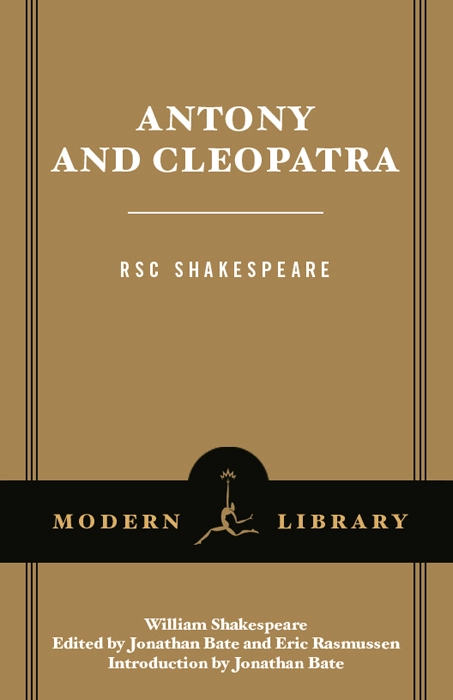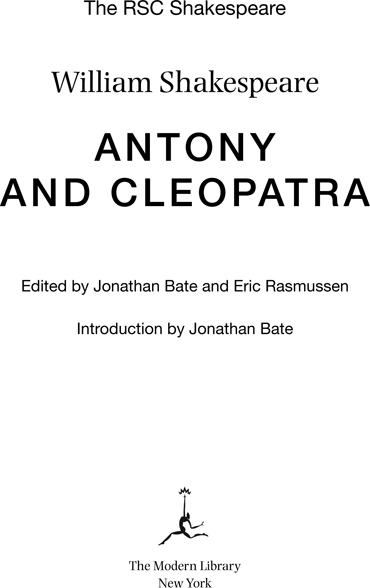Antony and Cleopatra

The RSC Shakespeare
Edited by Jonathan Bate and Eric Rasmussen
Chief Associate Editor: Héloïse Sénéchal
Associate Editors: Trey Jansen, Eleanor Lowe, Lucy Munro, Dee Anna Phares, Jan para
Antony and Cleopatra
Textual editing: Eric Rasmussen and Sophie Holroyd
Introduction and Shakespeare’s Career in the Theater: Jonathan Bate
Commentary: Jan Sewell and Héloïse Sénéchal
Scene-by-Scene Analysis: Esme Miskimmin
In Performance: Maria Jones (RSC stagings) and Jan Sewell (overview)
The Director’s Cut (interviews by Jonathan Bate and Kevin Wright): Adrian Noble, Braham Murray, Gregory Doran
Editorial Advisory Board
Gregory Doran, Chief Associate Director, Royal Shakespeare Company
Jim Davis, Professor of Theatre Studies, University of Warwick, UK
Charles Edelman, Senior Lecturer, Edith Cowan University, Western Australia
Lukas Erne, Professor of Modern English Literature, Université de Genève, Switzerland
Akiko Kusunoki, Tokyo Woman’s Christian University, Japan
Jacqui O’Hanlon, Director of Education, Royal Shakespeare Company
Ron Rosenbaum, author and journalist, New York, USA
James Shapiro, Professor of English and Comparative Literature, Columbia University, USA
Tiffany Stern, Professor and Tutor in English, University of Oxford, UK

CONTENTS
Introduction
An Egyptian Queen
The Noble Romans?
Overflowing the Measure
About the Text
Key Facts
The Tragedy of Antony and Cleopatra
Textual Notes
Scene-by-Scene Analysis
Antony and Cleopatra in Performance:
The RSC and Beyond
Four Centuries of Antony and Cleopatra: An Overview
At the RSC: Seven Cleopatras and Their Antonys
The Director’s Cut: Interviews with Adrian Noble,
Braham Murray, and Gregory Doran
Shakespeare’s Career in the Theater
Beginnings
Playhouses
The Ensemble at Work
The King’s Man
Shakespeare’s Works: A Chronology
The History Behind the Tragedies: A Chronology
Further Reading and Viewing
References
Acknowledgments and Picture Credits
INTRODUCTION
AN EGYPTIAN QUEEN
Antony and Cleopatra is Shakespeare’s most luxuriant tragedy. The action sprawls around the Mediterranean world as it gives historical form to the mythical encounter between Venus (the goddess of sexual love) and Mars (the god of war). The play is structured upon a series of oppositions: between female and male, desire and duty, the bed and the battlefield, age and youth, the philosophies of Epicureanism and Stoicism. Above all, between Egypt and Rome.
Henry Cockeram’s English Dictionary, published in the same year as the First Folio of Shakespeare’s collected plays, has an entry for Cleopatra: “an Egyptian Queen, she was first beloved of Julius Caesar; after, Marcus Anthonius was by her brought into such dotage that he aspired the Empire, which caused his destruction.” The idea that a great lawgiver or warrior could be destroyed by the lure of sexual desire was commonplace in the period. An earlier dictionary reminded the reader of how King Solomon in the Bible “exceeded all men in wisdom and knowledge” but “nevertheless was by dotage on women brought unto idolatry.” The primary definition of the word “dotage” was “to be mad or peevish, to play the fool (as old folks do).” To dote was to go against reason. To fall too far in love was to lose one’s wits. At the same time, the word was used with reference to old age: senility atrophies the powers of reason and makes an old person become a child again.
Antony and Cleopatra, as its first line informs us, is Shakespeare’s drama of dotage. “Nay, but this dotage of our general’s…”: Mark Antony, Roman general, who bestraddles the world with his military might, is growing old. He is growing foolish and he is crazily in love. Not a good combination for a soldier, but a great subject for a play.
Cleopatra, the Egyptian queen, is to Roman eyes a “quean,” which means a whore. She is the embodiment of sexual magnetism. A consummate actress, she is able to change her mood on a whim, to keep all around her guessing as to whether she is in earnest or at play. Linguistically, she has a marvelous gift of combining a tone of lightness and wonderment with a sexily down-to-earth robustness: “O happy horse, to bear the weight of Antony!” She is also the only woman in Shakespeare’s tragedies to have a wit comparable to that of his comic heroines, such as Rosalind in As You Like It and Portia in The Merchant of Venice. When news comes of the death of Antony’s wife, Cleopatra asks with feigned incredulity “Can Fulvia die?” This arch question plays on the double entendre whereby to die could mean to have an orgasm. Roman wives, she implies, are frigid creatures. Cleopatra is a grown-up Juliet: utterly confident in her body, she relishes her own sexuality and is the dominant partner in the relationship.
There is, however, a darker side to her powers. She uses both her sexual allure and her regal authority not only to seduce and to charm, but also to manipulate and to emasculate. She savages the messenger who brings news she does not want to hear. Her principal courtiers are women, Charmian and Iras. In Shakespeare’s source (of which more in a moment), Plutarch complained that the affairs of Antony’s entire empire were determined by these two women of the bedchamber. While frizzling Cleopatra’s hair and dressing her head, Plutarch implies, Charmian and Iras change the course of world history. There are only two men in the immediate entourage of the Egyptian queen. One is in the strict sense emasculated: Mardian the eunuch. The other is Alexas, whose name would have conjured up in the minds of the more educated members of a Renaissance audience the Alexis of the Roman poet Virgil’s second Eclogue. “Cruel Alexis” is the “lovely boy” (formose puer) who refuses to yield to the burning sexual desire of a shepherd called Corydon. To echo his name was automatically to evoke homoerotic desire, which in Shakespeare’s time was also castigated as a form of emasculation.
The name “Alexas” signals the trickier aspect of the Greek influence on Roman culture. Ancient Greece provided classical Rome—and Elizabethan England—with a back-catalogue of military heroes and ideals: Alexander the Great, the generals who fought the Trojan war, the Spartan model of military training. But “Greek love,” as espoused in, say, Plato’s Symposium, was hardly calculated to reinforce the Roman code of masculinity. The notion that the good life involved ascending a ladder of love that proceeded in an unbroken progression from the buggering of boys to contemplation of the divine did not sit well with an ideology of cold baths and route marches.
Historically, Cleopatra’s allegiance was to the Greek as opposed to the Roman world. Her family, the Ptolemies, were Macedonian Greeks.
1 comment